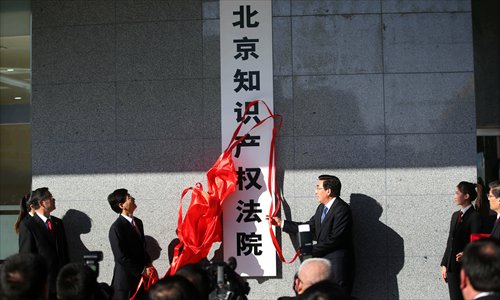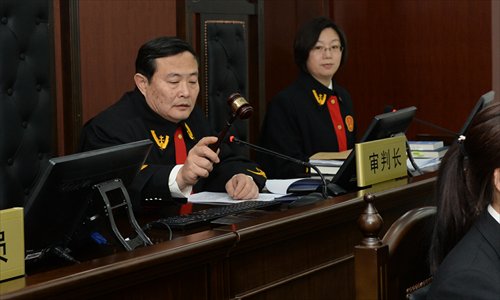Intellectual clarity
New courts make IPR enforcement smoother, but problems linger

Senior officials unveil the official opening of the Beijing Intellectual Property Court on November 6, 2014. Photo: CFP
In November and December, China established three intellectual property rights (IPR) courts in Beijing, Guangzhou and Shanghai. Many have hailed the new courts as a big step towards unifying rulings on offenders and improving IPR protection. However, critics have said that the effect of the three courts will be limited and are calling for stricter sentencing for IPR infringers, so as to spur domestic innovation and invention.
After widespread criticism from abroad for failure to protect intellectual property rights (IPR), China has established three special courts in Beijing, Guangzhou and Shanghai to handle IPR cases, in a bid to enhance the efficiency of enforcement.
The country's image as a hotbed of piracy and shanzhai (imitation) goods has changed little despite repeated crackdowns and efforts at tightening control.
The new system is designed to unify rulings. Previously, IPR-related cases were all covered by seperate divisions in ordinary courts, resulting in disparate rulings on similar cases. The new courts will handle all IPR cases that come up from lower courts, and the IPR divisions in other courts will be gradually abolished after existing cases conclude.
Unlike the two IP courts in Beijing and Shanghai, whose jurisdictions are limited to the metropolitan area, the Guangzhou Intellectual Property Court is entitled to hear the IP cases from the whole of Guangdong Province, save for the Shenzhen Special Economic Zone.
Many IPR experts and lawyers are happy about the establishment of the three courts, and improvements such as easier filings and shorter hearings are already apparent. But some are still pessimistic, saying that supposedly stricter IPR protection will mean nothing unless the judges dole out heavier punishments to offenders.
Efficiency boost
The Beijing Intellectual Property Court, situated on the West Fourth Ring road in Haidian district, began operation on November 6, 2014.
As of January 20, it had accepted a total of 789 cases and heard 83 of them, with 40 percent of the cases relating to patent, technical secrets and computer software, according to statistics cited by Jiang Ying, a chief judge of the court, on her verified Sina Weibo account.
Among the 670 first cases, 20 percent had overseas ties, according to the screenshot she published.
"My agent went to hand in my indictment materials soon after the court was opened," Ren Wenlin, an inventor from Wuhan, Central China's Hubei Province, told the Global Times. "I was rather confident in the new court as the judges are all famous and trusted, including Song Yushui, dubbed a 'goddess of justice' among IPR circles."
Ren's defendants include Mercedes-Benz, BMW and Porsche, he having accused the automakers of infringing his patent on door locks and tires. On the morning of February 4, the trial against Mercedes-Benz was heard in Beijing's IP Court.
Ren is a prolific inventor. According to the China Patent Inquiry System, Ren has filed 137 patents since 1992, including locks and tires. But some of his patents may have become invalid due to a failure to pay the necessary upkeep fees.
"This time the court accepted the lawsuits faster and the trial lasted shorter, less than two hours," said Ren, who has filed scores of lawsuits in the past decade, most ending up in losses or with charges withdrawn after reconciliation.
The verdict hasn't been announced yet, but Ren presumed he might lose the case again as the evidence he and his agent provided seemed not convincing to the judges during the hearing.
Specialist panels
According to the Legal Daily, several other changes are noticeable in the new system.
Each hearing, as well a collegial panel of three and a court clerk, involves a judge assistant who is in charge of verifying the identities of the plaintiff and defendant, and reading out their rights and obligations ahead of the trial. The assistant can assist the investigation and has right to pose questions during the hearing.
Ren Baoxin, a lawyer with six years of experience on patent cases from Beijing Guokai Law firm, has already filed close to 20 cases for his litigants from the three newly established IP courts in Beijing, Shanghai and Guangzhou. One administrative case against the State Intellectual Property Office (SIPO) was recently heard in Beijing's IP court, and he has seen some improvement in the trial process.
"Unlike before, when the judge would arbitrarily interrupt my justification by saying 'Enough, I know that already!', the chief judge listened to my presentation carefully. In the end, she also politely solicited an opinion from the assistant," Ren told the Global Times.
In addition, the judges, the assistant and clerk are either specialists in IPR cases or well educated with related expertise, he said. The 25 judges selected for the Beijing IP Court, 91 percent of whom had a master's degree or above, have an average age of 40 and average IP-related case hearing experience of 10 years.
Unlike in most countries, judges in China are not normally experienced lawyers, but are trained through an entirely separate process and often become judges at what, elsewhere, would be considered a strikingly young age.
The new courts have also simplified the trial procedures. After the parties present their claims, the judge will suggest consolidating the disputes and having both parities argue with a tighter focus, which has greatly improved the efficiency of the process.
Wang Qian, an intellectual property professor with the East China University of Political Science and Law in Shanghai, said the major significance of the IP courts lies in unifying judgment. "Because of different understanding of the law by different judges, verdicts have varied sharply in different courts on similar cases," Wang told the Global Times.
More IP courts might be established but where they are founded will depend on the region's economic development and its frequency of IPR-related disputes, he noted.
Costs of theft
Despite the positive changes, several interviewees still expressed their concerns and hope for further reforms to make it easier to take IPR offenders to court and raise the penalties imposed on them.
"We have invested a lot on research and innovation, but our enthusiasm to innovate is always frustrated, since our IPR is not well protected and cost of illegal behavior is too low," Shenzhen Abramtek Company Limited's general manager, surnamed Zhang, told the Global Times.
The company, a maker of audio digital products, quickly found imitation versions of its products on sale after they were launched. One set of speakers is sold for 290 yuan, but shanzhai versions sell for less than 30 yuan.
Attempts to remedy the system legally have been less than effective. "Sometimes when we approached the imitator, they freely admitted they had used our patents, but they were not afraid at all but said 'So sue us!'," Zhang complained.
So far, the company, together with the patent owner, has taken more than 100 companies to court for providing sales platform for selling and manufacturing the products illegally using their patents.
They won some of the lawsuits, but the compensation the offenders were sentenced to pay was far less than the combined expenses of the court case, gathering evidence and lost business.
"The major problem is that the compensation the court imposes on wrongdoers is usually too small," lawyer Ren Baoxin said. In many cases he worked in Beijing, the compensation was around 10,000 yuan, which was less than the fee to hire a lawyer, he said.
The standard for compensation can be decided by the offender's profit, the plaintiff's losses or the court's discretion. It's difficult to determine how much the offender has profited, and it's also hard to estimate losses, so in most occasions, the court itself rules on the compensation, he explained.
"But the compensation they rule is usually small. The reason may be that the judges feel sympathy for those small business owners and they worry the harsh penalty would cause discontent and complaints, which might cause social instability," Ren said, noting that the tolerance has indulged the IPR infringers.
Lawyers also sometimes find it difficult to serve the offenders, which can delay trials. The accused patent offenders have many ways to dodge being present at courts, such as changing the names of their legal entity and refusing to sign for court summons, Ren said.
"With high-tech products, especially the digital products, their market viability is just two to three years. But sometimes, a lawsuit can last for two years from filling to conviction," Zhang said.
Heavy workload
Nevertheless, many are still confident about the IPR protection brought by stronger judicial measures. The China Audio-Video Copyright Association said in its year-end summary that it has earned record high royalties of 139 million yuan last year. Meanwhile, it has cooperated with 110 law firms nationwide, gathered evidence on over 3,000 KTV managers, and either reached on agreement or tried to send them to court last year.
But some still worry about the quality of the trials in the IP courts. As the desire to protect IPR in China grows, the number of IPR-related lawsuits will increase rapidly. Su Chi, the president of the Beijing IP court, estimated that the number of annual filings the court will receive in next seven to eight years will be at least 15,000, most of them initial hearings rather than being sent up from a lower court.
According to the statistics disclosed by the Guangzhou IP Court, which was established on December 16, it accepted 539 cases in the first month, double that of its Beijing counterpart. But it currently has only 10 judges, as opposed to 25 in the Beijing IP court.
The judges had each handled 438 cases in the past five years on average before being selected for the Beijing IP Court.
But accepting 15,000 cases means that each of them shall handle 600 cases a year, which is more than their workload for the five years prior. A trial schedule for the Beijing IP court shows that in a single day, 27 cases were heard.
"There might be a challenge of heavy workload and the court can make personnel adjustments if there's a staff shortage," said professor Wang.
Guangzhou's IP Court is considering recruiting a new batch of judges, according to media reports.
Inventors also called for tighter licensing of IPR rules. Among the cases the Beijing IP court had received, 60 percent of them were brought against administrative organs for IPR certification errors or other wrongdoings, including the SIPO and Trademark Review and Adjudication Board, State Administration for Industry and Commerce.

Judges at the Beijing Intellectual Property Court rule on a case. Photo: IC